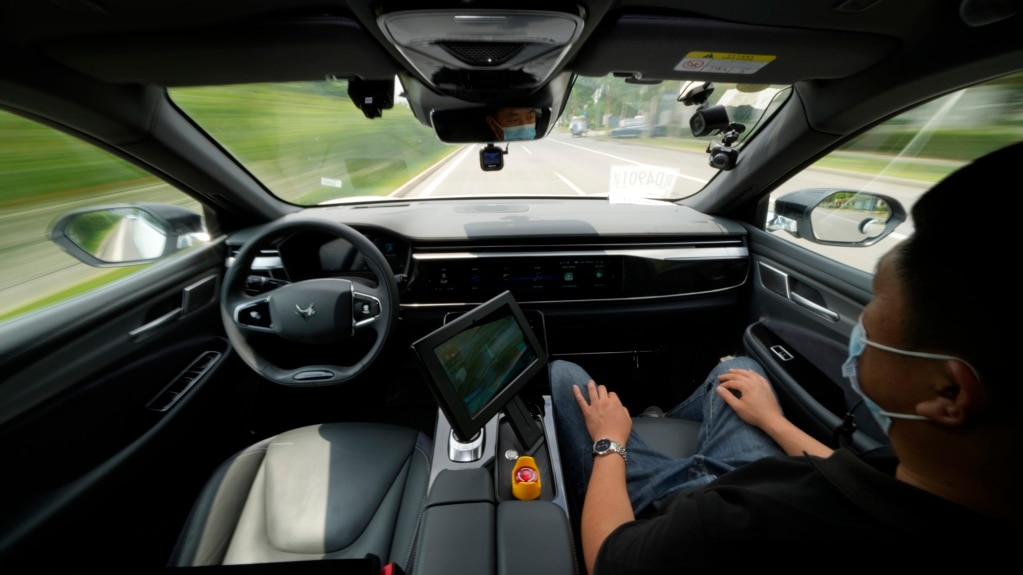The administration of U.S. President Joe Biden has proposed a ban on the sale of self-driving vehicles in the U.S. using Chinese or Russian technologies.
The proposal was recently announced by the U.S. Commerce Department. The ban would bar sales of internet-connected and self-driving vehicles equipped with software or hardware provided by China or Russia.
The purpose of the measure is to protect national security and American drivers, the Commerce Department said. A press release called the connectivity and autonomous vehicle technologies “critical systems” that need strong protection.
The department noted that providing access to such systems through software or hardware could lead some foreign governments to “collect our most sensitive data” and seek to control vehicles on American roads.
U.S. Commerce Secretary Gina Raimondo spoke to reporters from The Associated Press (AP) and other media organizations last week about the proposal. She described a possible extreme situation in which a foreign enemy could shut down or take control of multiple vehicles operating in the U.S. Such an incident could cause major crashes and huge traffic problems, Raimondo said.
“This is not about trade or economic advantage. This is a strictly national security action,” Raimondo said. She added, “The good news is right now, we don’t have many Chinese or Russian cars on our road."
Raimondo said leaders in Europe and other parts of the world had raised security concerns about the large number of Chinese vehicles already on the roads in their areas. Imported Chinese-owned vehicle models captured 7.6 percent of Europe’s electric car market in 2023, the European Automobile Manufacturers’ Association said. That was up from 2.9 percent in 2020.
Janka Oertel is director of the Asia program at the European Council on Foreign Relations. She wrote on the council’s website that the security concerns in Europe included “matters of national security, cybersecurity and individual privacy.”
Raimondo noted the U.S. cannot wait until the nation’s roads are already populated with vehicles containing Chinese or Russian technology. “We're issuing a proposed rule to address these new national security threats before suppliers, automakers and car components linked to China or Russia become commonplace and widespread in the U.S.,” she said.
Commerce Department officials said the proposed ban on software would take effect with 2027 vehicle model years. A ban on hardware would take effect beginning with 2030 models. The officials said the different dates were set because software is much easier to change than physical hardware parts.
The software and hardware bans would cover vehicles equipped to communicate through Bluetooth, cellular, satellite or Wi-Fi systems. It would also ban the sale or import of software made in Russia or China that permits self-driving vehicles to operate without a driver in control. The ban would also cover vehicles made in the U.S. using Chinese and Russian technology.
The proposed rule would be for all vehicles except those not used on public roads, such as vehicles used for agricultural or mining purposes.
American automakers have said they share the government's national security goal. But currently, they say the need for such a measure is low. That is because there is very little software and hardware technology coming to American vehicles from China and Russia.
But the industry group Alliance for Automotive Innovation said the new rules will force some automakers to immediately search for new parts suppliers. “You can't just flip a switch and change the world's most complex supply chain overnight,” said the organization’s chief, John Bozzella.
Bozzella noted the timetables to begin the ban should be long enough for some automakers to make changes, “but may be too short for others.”
Administration officials told the AP that Commerce Department representatives met with officials from all major auto companies around the world while preparing the proposals. The officials also met with different industry organizations in an effort to understand the current supply chain issues.
The Commerce Department is currently taking public comments on the ban. This process generally lasts for 30 days after a rule is published. Agency officials said the finalization of the measure should happen by the end of the Biden Administration.
I’m Bryan Lynn.

